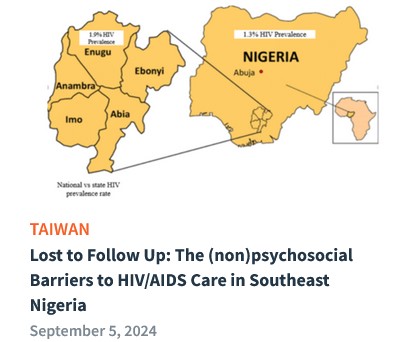
Lost to follow up: the (non)psychosocial barriers to HIV/AIDS care in southeast Nigeria
AUTHOR
Elochukwu Ernest Uzim, 李柏翰 (Po-Han Lee) ✉️(本所專任助理教授)
JOURNAL AIDS Care
PUBLISHED 2024.09.04
ABSTRACT
Medication withdrawal remains a problem in Nigeria’s HIV care. The Enugu state of southeast Nigeria has 3,736 people living with HIV/AIDS (PLHIV), with a 1.9% HIV-positive prevalence rate among the age band of 15–49 years, higher than 1.3%, the national average for the same cohort. Despite the disease burden, many cases are “lost to follow-up” in this region. Through four focus groups of patients (20 participants in total) and in-depth interviews with four clinicians from four public hospitals, this study aimed to understand the barriers to attending healthcare appointments faced by young adults. The participants were recruited through flyers, posters, and snowballs at clinics; both data sets were first analysed separately yet used to triangulate each other. We found that clinical interruptions are mainly attributable to factors such as stigma, suicidal ideation, loss of means of livelihood due to PLHIV’s “new identities”, and thus poverty and malnutrition. These barriers, complicated by the COVID-19 pandemic and armed conflicts in the region, have made medication adherence further challenging. Therefore, we recommend the Nigerian government integrate non-biomedical support for PLHIV into people-centred HIV care.
ASPPH Letter
臺大公衛學院為加強宣導本院教師之學術成果,進而提升本院國際能見度,由李柏翰老師之撰寫下列文章投稿至ASPPH Friday Letter.
該文目前已刊登於 ASPPH Friday Letter, September 6, 2024

